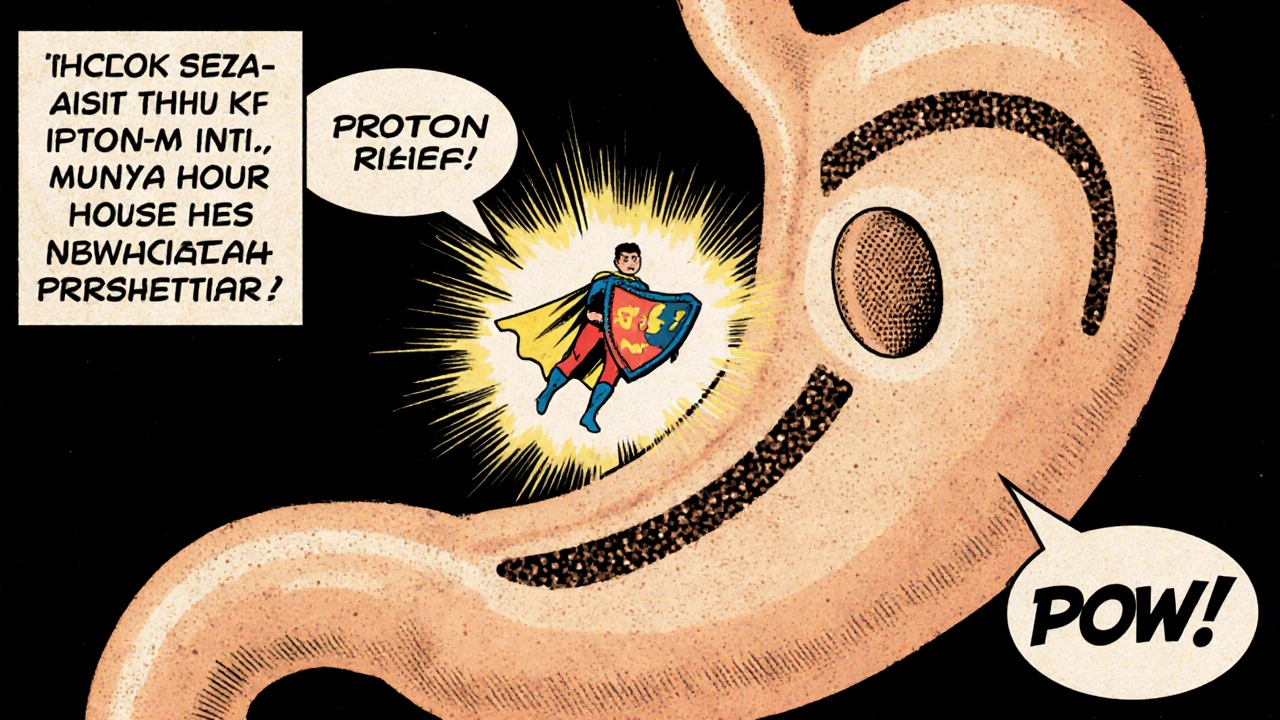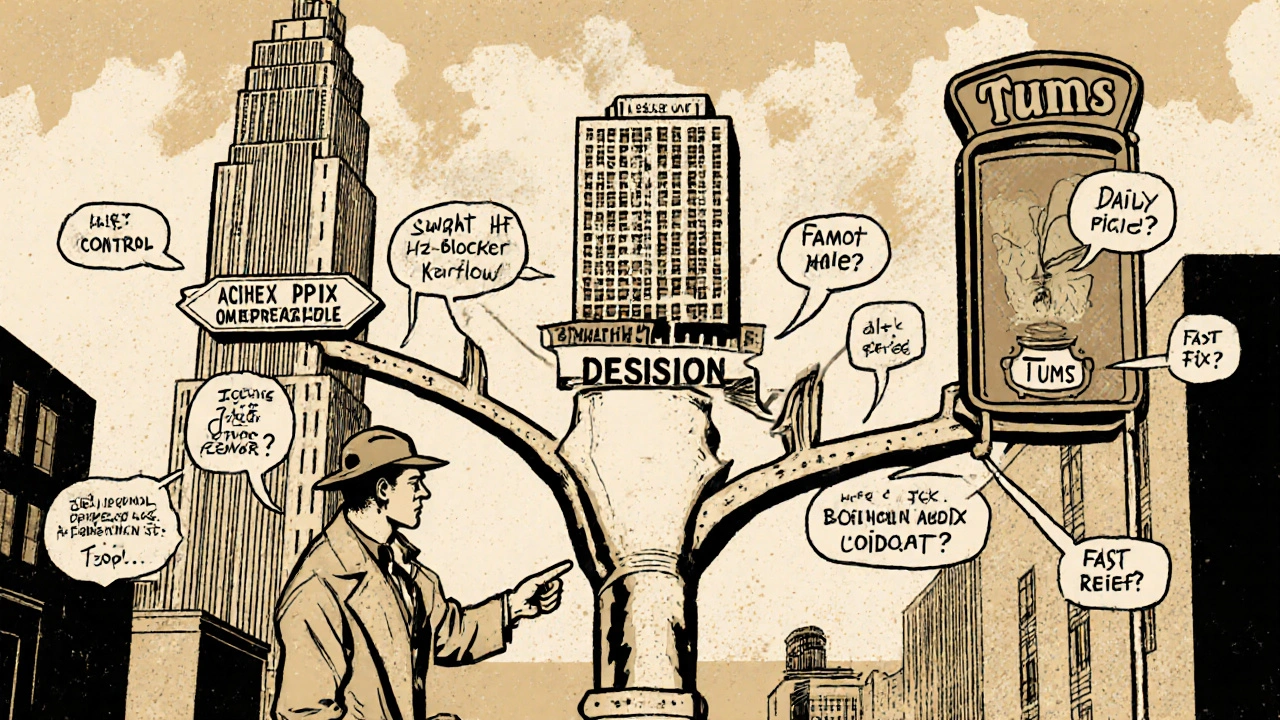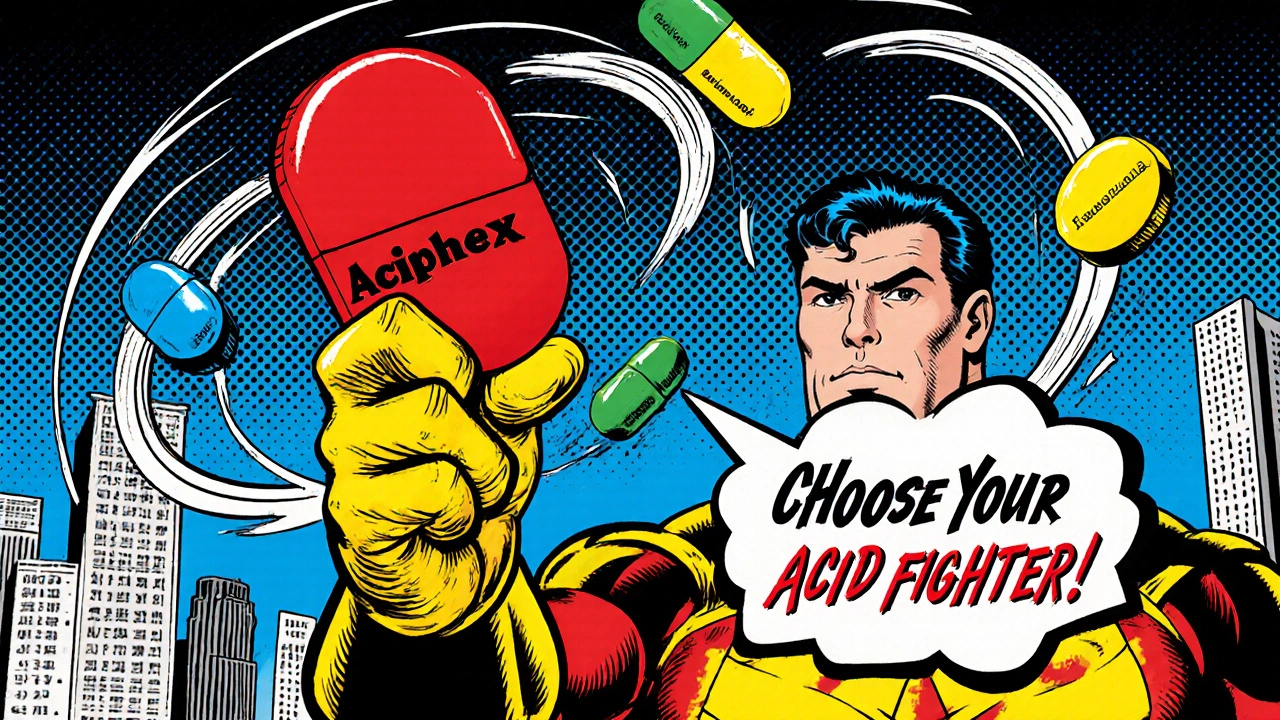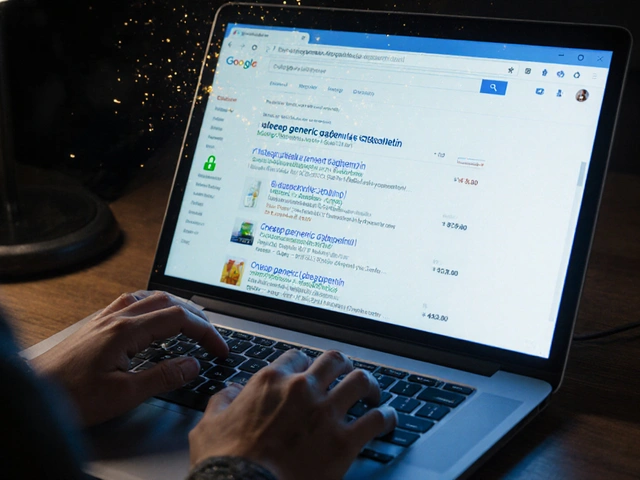Acid Reducer Selector
Choose Your Situation
Your Recommended Option
This tool provides general guidance based on common clinical scenarios. Consult your healthcare provider before making medication changes.
When you reach for a pill to tame heartburn, the name Aciphex often pops up. But is it really the top choice, or are there cheaper or faster‑acting options? This guide breaks down Aciphex (rabeprazole) side‑by‑side with the most common alternatives, so you can decide what fits your stomach - and your budget.
Key Takeaways
- Aciphex is a third‑generation proton pump inhibitor (PPI) with a rapid onset and fewer drug‑interactions than older PPIs.
- Older PPIs - omeprazole, lansoprazole, pantoprazole - are generally cheaper and work equally well for most people.
- H2 blockers such as famotidine act faster but provide a shorter duration of acid suppression.
- Antacids (calcium carbonate) give instant relief but need to be taken frequently.
- Choosing the right option depends on how often you need relief, any other meds you take, and cost considerations.
How Acid‑Reducing Drugs Work
Stomach acid is produced by the H+/K+ ATPase enzyme, often called the “proton pump.” PPIs block this pump, shutting down acid production for up to 24 hours. H2 blockers, by contrast, block histamine‑2 receptors on parietal cells, cutting acid output for 4‑8 hours. Antacids neutralize acid already present, offering immediate but brief relief.
Aciphex (Rabeprazole) Overview
Aciphex is a proton pump inhibitor that selectively inhibits the gastric H+/K+ ATPase, reducing gastric acid secretion. FDA‑approved in 2001, it’s available in 20mg and 40mg delayed‑release tablets. The drug’s half‑life is short (1‑2hours), but its effect lasts the full 24hours because it binds irreversibly to the pump.
Key attributes:
- Onset of action: ~1hour
- Duration: 24hours
- Metabolism: Mostly non‑CYP mediated, lowering interaction risk
- Common uses: GERD, erosive esophagitis, H.pylori eradication (as part of triple therapy)
Older PPIs - The Classic Alternatives
All of these belong to the same drug class, share the same mechanism, but differ in potency, dosing, and cost.
Omeprazole is the original PPI, launched in 1989. It’s typically prescribed at 20mg once daily, with an onset of 1‑2hours and a 24‑hour duration. Because it’s metabolized by CYP2C19, it can interact with certain antidepressants and clopidogrel.
Esomeprazole is the S‑isomer of omeprazole, marketed as Nexium. The 20‑40mg dose offers slightly higher bioavailability, making it a go‑to for patients who don’t respond to standard PPIs.
Lansoprazole (Prevacid) provides a similar 24‑hour effect at 15‑30mg, and is often chosen for its lower cost in generic form.
Pantoprazole (Protonix) is notable for its minimal CYP involvement, ideal for patients on multiple meds. Typical dose: 40mg daily.

H2 Blockers - Faster but Shorter
Famotidine blocks H2 receptors, lowering acid output within 30minutes. Doses range from 20‑40mg twice daily, with effects lasting 4‑6hours. It’s a solid backup for night‑time symptoms when a full‑day PPI isn’t needed.
Ranitidine was another option, but it was withdrawn worldwide in 2020 due to NDMA contamination concerns.
Antacids - Immediate Relief
Antacids such as calcium carbonate neutralize existing acid. They work within minutes but need re‑dosing every 2‑3hours. They’re cheap and safe for occasional heartburn, but they don’t heal esophageal irritation.
Side‑Effect Snapshot
- PPIs (Aciphex, omeprazole, etc.): risk of vitaminB12 deficiency, calcium loss, and rare C.difficile infection when used >1year.
- H2 blockers: generally well‑tolerated; occasional headache or dizziness.
- Antacids: may cause constipation (calcium) or diarrhea (magnesium).
Choosing the Right Acid Reducer - A Quick Decision Tree
- Do you need **daily, long‑term** control? → Choose a PPI (Aciphex or a cheaper generic). \n
- Do you take many other prescriptions that rely on CYP enzymes? → Prefer Aciphex or pantoprazole (lower interaction risk).
- Is cost the primary concern? → Generic omeprazole, lansoprazole, or pantoprazole are usually the cheapest.
- Do you only need **occasional, fast** relief? → Try famotidine or an antacid.
- Are you pregnant or nursing? → Famotidine and calcium carbonate antacids are generally considered safest.

Comparison Table
| Generic | Brand (US) | Typical Dose | Onset | Duration | Key Advantage |
|---|---|---|---|---|---|
| Rabeprazole | Aciphex | 20mg daily | ≈1hour | 24hours | Low CYP interaction |
| Omeprazole | Prilosec | 20mg daily | 1‑2hours | 24hours | Widely available, cheap |
| Esomeprazole | Nexium | 20‑40mg daily | ≈1hour | 24hours | Higher bioavailability |
| Lansoprazole | Prevacid | 15‑30mg daily | 1‑2hours | 24hours | Low cost generic |
| Pantoprazole | Protonix | 40mg daily | 1‑2hours | 24hours | Minimal drug interactions |
| Famotidine | Pepcid | 20‑40mg BID | ≈30minutes | 4‑6hours | Fast relief, cheap |
| Calcium Carbonate | Tums | 500‑1000mg PRN | Immediate | ≤2hours | Instant neutralization |
Practical Checklist Before Switching
- Review current prescription list for CYP‑dependent drugs.
- Check insurance formularies - generic PPIs often have $0 copay.
- Assess symptom frequency: daily vs. occasional.
- Consider any existing nutrient deficiencies (B12, calcium).
- Discuss with a pharmacist or physician if you’re pregnant.
When to See a Doctor
If heartburn persists despite daily PPI use for 8weeks, you may need endoscopy to rule out Barrett’s esophagus. Also seek care if you notice unexplained weight loss, difficulty swallowing, or frequent vomiting.
Frequently Asked Questions
Is Aciphex stronger than omeprazole?
Both drugs suppress acid to a similar degree. Aciphex’s advantage lies in its lower potential for CYP‑mediated interactions, not in outright potency.
Can I take Aciphex with ibuprofen?
Yes, Aciphex can protect the stomach lining when you need NSAIDs, but you should still use the lowest effective ibuprofen dose and consider adding a protective H2 blocker if symptoms arise.
How long is it safe to stay on a PPI?
Short‑term (up to 8‑12 weeks) use is generally safe. For chronic GERD, doctors may keep you on a low‑dose PPI indefinitely, but they’ll monitor for vitamin B12, magnesium, and bone density.
Is famotidine better for night‑time heartburn?
Famotidine works quickly and lasts 4‑6hours, making it a solid choice before bedtime if you only need occasional relief. It won’t provide the 24‑hour coverage a PPI does.
Can antacids replace PPIs for chronic GERD?
No. Antacids neutralize existing acid but don’t prevent new acid from being produced, so they’re useful for occasional spikes, not for healing the esophagus.




Hey everyone if you’re looking at acid reducers Aciphex is a solid option its quick onset and low CYP interaction make it worth a try.
Aciphex, known generically as rabeprazole, sits in the newer generation of proton pump inhibitors and that alone gives it a reputation for being a bit more refined than its older cousins. The drug’s rapid onset-about an hour after ingestion-means many patients notice relief sooner than they might with omeprazole, which can take a little longer to feel the effects. Because it binds irreversibly to the gastric proton pump, the suppression of acid production persists for a full 24‑hour window, allowing once‑daily dosing for most indications. One of the biggest selling points, especially for those juggling multiple prescriptions, is its minimal reliance on the CYP2C19 pathway, which drastically lowers the chance of drug‑drug interactions that can plague older PPIs like omeprazole. In practice this translates to fewer headaches when you’re also on antidepressants, clopidogrel, or certain antifungals. Cost is another factor; while brand‑name Aciphex can be pricier than generic omeprazole, many insurance plans treat the generic version of rabeprazole similarly, making it a viable option for budget‑conscious patients. For individuals with chronic GERD who need long‑term control, stepping down to the cheapest effective PPI after an initial trial is a common strategy, and Aciphex can serve as that initial high‑efficacy entry point. When comparing side‑effect profiles, the risks of vitamin B12 deficiency, calcium malabsorption, and possible increased susceptibility to Clostridioides difficile infection are class effects shared across all PPIs, so there’s no magical safety advantage here. However, the lower interaction potential can be a real peace‑of‑mind benefit for polypharmacy patients. If you’re pregnant or nursing, many clinicians still favor H2 blockers such as famotidine or simple antacids like calcium carbonate because the data on PPIs in pregnancy, while reassuring, is still not as robust as for those older, simpler agents. For acute, night‑time heartburn, famotidine’s rapid 30‑minute onset and 4‑6‑hour duration make it a handy rescue pill, whereas Aciphex shines when you need continuous, round‑the‑clock protection. It’s also worth noting that some patients report a “rebound” acid hypersecretion when they stop taking PPIs abruptly, a phenomenon that can be mitigated by tapering the dose rather than stopping cold turkey. In the end, the decision often comes down to a balance of speed, duration, interaction risk, and cost, with Aciphex offering a respectable middle ground. So before you pick a pill, have a chat with your pharmacist or doctor about your full medication list, your symptom frequency, and how much you’re willing to spend, and you’ll land on the right choice for your stomach health. Remember, no single acid reducer works for everyone, so personal trial and error under medical supervision is key.
So you think a pill can magically fix your gut? The pharma machine loves to market the newest “better” version while the real answer is often lifestyle and diet. Trust the science but watch the hype.
It is a moral imperative to question why we accept acid reducers as a first‑line habit instead of addressing the root causes like stress and poor eating habits. The convenience of a tablet should never replace a holistic view of health, and we must demand more from our medical community than quick fixes.
Aciphex works but it’s not the only game in town.
Honestly the whole “newer is better” narrative is overrated; older PPIs like lansoprazole have stood the test of time and cost a fraction of Aciphex, so why pay extra for marginal gains?
While the data suggest comparable efficacy between rabeprazole and other PPIs, one cannot ignore the extensive lobbying that influences formulary placements, potentially skewing prescribing patterns toward more profitable brands.
Imagine the fiery storm in your chest when heartburn attacks at night-famotidine swoops in like a heroic knight, delivering fast relief, while Aciphex stands as the steadfast guardian, keeping the flame at bay for an entire day.
Aciphex is fine it does the job
I totally get how overwhelming the choices can feel; there are so many pills out there promising relief, and it’s easy to feel lost in the sea of options. 🤗 Remember, you’re not alone in this-many people grapple with the same questions about cost, side effects, and effectiveness. If you’re leaning toward Aciphex because of its low interaction profile, that’s a solid reason, especially if you’re on multiple meds. However, if budget is a major concern, generic omeprazole or lansoprazole can provide similar acid suppression at a lower price point. 💰 It can also help to try a short course of famotidine for quick, intermittent episodes and reserve a PPI for chronic management. 🕒 Ultimately, talk to your healthcare provider about your specific situation; they can tailor the regimen to fit both your medical needs and your wallet. 🌟
In the dance of acid and medicine, balance, not dominance, restores harmony.
That metaphor resonates; culturally, many traditions emphasize moderation in treatment, suggesting we should view PPIs as part of a broader lifestyle symphony rather than a solo instrument.
Indeed, respecting the body’s natural rhythms while judiciously using medication can foster a healthier relationship with our digestive system.
Aciphex does the job, but pairing it with diet tweaks often enhances the result.
The epic narrative of acid suppression mirrors the age‑old battle between fire and water, where Aciphex stands as a steadfast dam holding back the torrent of burning reflux.
Cost matters but efficacy should be the priority.
From a global health perspective, ensuring access to both affordable generic PPIs and newer agents like rabeprazole is essential for equitable management of gastro‑oesophageal disorders across diverse populations.